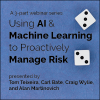Business Transformation Requires Transformational Leaders
Leadership and teaming skills are front and center in times of rapid change. Meet today’s constant disruption head on with expert guidance in leadership, business strategy, transformation, and innovation. Whether the disruption du jour is a digitally-driven upending of traditional business models, the pandemic-driven end to business as usual, or the change-driven challenge of staffing that meets your transformation plans — you’ll be prepared with cutting edge techniques and expert knowledge that enable strategic leadership.
Subscribe to Arthur D. Little's Culture & Leadership Newsletter
Insight
Executive Update
Paving Your Way to Customer Excellence in the B2B Market
To remain successful and to disrupt instead of being disrupted, best-in-class B2B organizations are recognizing the increasing importance of “the customer experience” to maximize value. Consequently, they have initiated profound transformations to develop customer preference and maximize margins.
A critical factor for the past failure of many Agile initiatives is that leaders are disengaged from their strategies. They’re not taking responsibility for the deep learning, mindset shift, personal role shift, and cultural shifts required of them in a transformation of this magnitude. The failure is not specifically about Agile. Indeed, any significant change initiative needs this sort of leadership engagement, where the leaders must go first in leading, or showing the way.
Business architecture is a critical — and typically missing — bridge between strategy and execution. Organizations should leverage it to translate strategies and other business direction and collectively architect, prioritize, and plan actions to be taken from a business-driven, enterprise-wide perspective. Indeed, business architecture and business architects contribute unique value across the strategy execution lifecycle, as well as connect other teams and help them be more effective.
Webinar
Risk-Driven Operational Planning
Now is the time for risk managers to focus on real-time analytics and proactive loss prevention, rather than administering risk systems related to operational processes. Here, Craig Wylie looks at how to use the AI/ML technology in practice; the capabilities that need to be in place; best practices for communicating risk and risk mitigation strategies; how to avoid “crying wolf”; rebalancing globalism and outsourcing.
The most critical element of a digital shift is the identification of a clear need or opportunity that digital technology can address. Successful enterprises continually examine their marketplaces along with how those marketplaces are changing. They also look at both their processes — and how to carry them out better, faster, and cheaper — and new technologies that could open up hitherto infeasible opportunities.
Collaboration is a key factor in solving many complex problems, including the one we currently face. In fact, collaboration is a new paradigm that is increasingly finding its way into many traditional practices, including the modern corporation, where it has been introduced via horizontal organizations. Horizontal organizations are based on collaboration and trust as their default strategy. This kind of organization increases employee satisfaction and builds higher profits. In this Advisor, we examine how practices such as an open-book management policy (OBM), consent decision making, and a bold profit-sharing policy lead to greater profit and, ultimately, real customer satisfaction.
The time-honored approach to quantifying markets is to work outward from a specific technology or tool to a targeted customer who will potentially use the technology in myriad ways. These potential markets with applicable benefit from the technology are then tabulated into initial total addressable markets (TAMs). In turn, the TAMs help justify strategic investment in an organization or the investment round in a startup.
The job of the IT strategy isn’t to align to the business strategy. It’s to give the business people who create it as many options to change tack as possible. It’s a provider of IT capability in support of strategic business capabilities. Supporting, enabling, and aligning with core business capabilities equals competitive advantage when the business strategy is a good one.





















